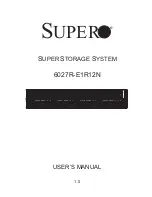
INS_NW7[E]/M_REV– 06/10/13 PAGE 65
INSTALLATION AND OPERATION MANUAL
NW7[E]/M
TECH SUPPORT: 1.888.678.9427
Term
Definition
Layer 2 Data
link layer of the Open Systems Interconnection (OSI) model. This corresponds to
the Link layer of the Internet protocol suite.
MAC Address
Media Access Control Address. This is a globally unique identifier attached to a
network adapter. It also identifies the hardware manufacturer.
Mbps
Megabits per second. Also Mbit/s. This is a measure of the data rate.
MiniPCIe
Mini Peripheral Component Interconnect Express. A miniPCIe radio is a radio card
that can be inserted into a router's circuit board.
MTU
Maximum transmission unit. This is the size, in bytes, of the largest packet that can
be passed on. The MTU for Ethernet is a 1500-byte packet.
NAT
Network Address Translation. This is the process of rewriting IP addresses as a
packet passes through a controller or firewall. NAT enables multiple computers
(or hosts) on a LAN to access the Internet using the single public IP address of the
LAN's gateway controller.
NMS
Network Management Station. This is a software which runs on the SNMP
manager. It is sometimes simply referred to as an SNMP manager.
NTP
Network Time Protocol. This is a protocol for synchronizing a controller to a single
clock on the network, known as the clock master.
PAP
Password Authentication Protocol. This is a protocol for authenticating users to a
remote access server or ISP.
PPPoE
Point-to-Point Protocol over Ethernet. This is a protocol for connecting a network
of hosts to an ISP without the ISP having to manage the allocation of IP addresses.
PPTP
Point-to-Point Tunneling Protocol. This is a protocol for the creation of VPNs for the
secure transfer of data from remote clients to private servers over the Internet.
QoS
Quality of Service. This is the prioritization of network traffic. Voice traffic gets
the highest priority, followed by video, best effort, and background traffic, in this
order.
RADIUS
Remote Authentication Dial In User Service. This is a networking protocol that
provides Authentication, Authorization, and Accounting (AAA) management for
remote users. The RADIUS provides centralized management of usernames and
passwords.
SNMP
Simple Network Management Protocol. This is an Internet-standard protocol for
managing devices on IP networks. It consists of a set of standards for network
management, including an application layer protocol, a database schema, and a
set of data objects. SNMP exposes management data in the form of variables on
the managed systems, which describe the system configuration. These variables
can then be queried (and sometimes set) by managing applications.
SSID
Service Set Identifier. This is also known as the ESSID or the wireless network
name.
Station
A device that connects wirelessly to an access point.
Subnet
A portion of a network that shares a common address component. On TCP/IP
networks, subnets are defined as all devices whose IP addresses have the same
prefix. For example, all devices with IP addresses that start with 192.168.10 belong
to the same subnet.
TCP
Transmission Control Protocol. This is a protocol for transmitting data over the
Internet with guaranteed reliability and in-order delivery.






































